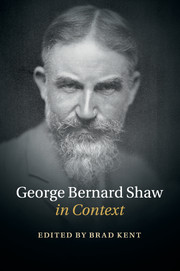Book contents
- Frontmatter
- Dedication
- Contents
- List of illustrations
- Notes on contributors
- Preface
- Acknowledgements
- A Chronology of Shaw's Works
- List of abbreviations
- PART I PEOPLE AND PLACES
- PART II THEATRE
- PART III WRITING AND THE ARTS
- 15 Cinema
- 16 Journalism
- 17 Letters
- 18 Media and technology
- 19 Modernism
- 20 Music
- 21 Novels
- 22 Publishers and publishing
- 23 Visual arts
- PART IV POLITICS
- PART V CULTURE AND SOCIETY
- PART VI RECEPTION AND AFTERLIFE
- Further reading
- Index
- References
21 - Novels
from PART III - WRITING AND THE ARTS
Published online by Cambridge University Press: 05 October 2015
- Frontmatter
- Dedication
- Contents
- List of illustrations
- Notes on contributors
- Preface
- Acknowledgements
- A Chronology of Shaw's Works
- List of abbreviations
- PART I PEOPLE AND PLACES
- PART II THEATRE
- PART III WRITING AND THE ARTS
- 15 Cinema
- 16 Journalism
- 17 Letters
- 18 Media and technology
- 19 Modernism
- 20 Music
- 21 Novels
- 22 Publishers and publishing
- 23 Visual arts
- PART IV POLITICS
- PART V CULTURE AND SOCIETY
- PART VI RECEPTION AND AFTERLIFE
- Further reading
- Index
- References
Summary
Bernard Shaw seldom wrote anything of an artistic nature that was not sui generis, largely because whatever literary conventions he used in his works were often used ironically to expose their inadequacy to convey or depict reality. So it comes as no surprise that while one can identify Shaw's five completed novels, written one a year from 1879 through 1883, as Victorian in general style, with plenty of stilted prose and manners to match, they also have so many non-Victorian elements in them that they too escape the usual genre classifications. Shaw's novels attempted to blend then avant-garde realism with comic fantasy, Dickensian social satire, the novel of ideas, parody of the popular novel, a modernised, anti-sentimental, anti-heroic version of the chivalric romance of Scott, postmodernist self-reference and open-endedness, and other stylistic twists. One of the reasons that it is almost fruitless to look in studies of the Victorian novel for commentary on Shaw's novels may be that even the few scholars who have read them have not found them lending themselves to the usual categories for comparisons with the canonical novelists. With such a hybrid and unique form, a crazy-quilt of straight, parodistic, and self-deconstructive elements, at once Victorian, modernist, and postmodernist in impulse, Shaw might have altered the direction of the British novel had publishers given him an immediate audience. The argument here, in fact, is that his novels are less significant to their Victorian context than they are as anticipations of such ground-breakers of the twentieth-century novel as Joyce's A Portrait of the Artist as a Young Man, with its example of autogenesis being foreshadowed by Shaw's novels, which amount to ‘a portrait of the artist as a young superman’, so to speak.
But Shaw's novels were buried at first by total rejection from publishers, and the staggering fact is that he kept going through five seemingly unpublishable novels like a man possessed. Why? And why did it take him so long to turn to drama if, as supposed, drama was his natural medium?
- Type
- Chapter
- Information
- George Bernard Shaw in Context , pp. 168 - 174Publisher: Cambridge University PressPrint publication year: 2015



